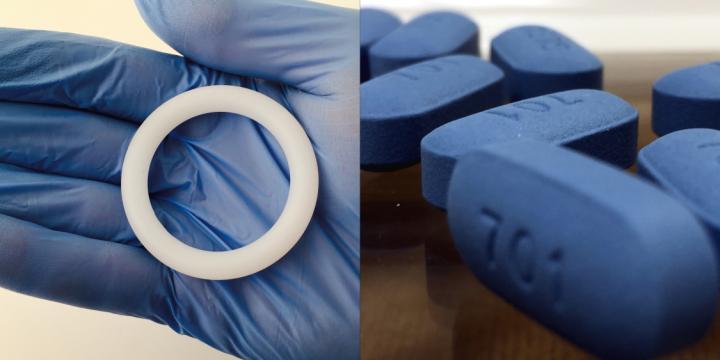NIH-supported research aims to expand HIV prevention choices

Credit: NIAID
WHAT:
A clinical trial has begun to examine the safety and use of two HIV prevention tools–oral pre-exposure prophylaxis (PrEP) and a vaginal ring–in adolescent girls and young women in southern Africa. Funded by the National Institutes of Health, the trial is designed to contribute to the delivery of safe, effective and desirable choices of HIV prevention methods for adolescent girls and young women, who are disproportionately affected by the HIV epidemic.
The Phase 2a clinical trial is called REACH, for Reversing the Epidemic in Africa with Choices in HIV prevention. It will enroll 300 girls and young women ages 16 to 21 years at five sites in Kenya, South Africa, Uganda and Zimbabwe. The ring in the study, which is replaced once a month, continuously releases the anti-HIV drug dapivirine in the vagina. The ring is currently undergoing regulatory review by the European Medicines Agency. PrEP involves taking a daily oral tablet containing two anti-HIV drugs, tenofovir and emtricitabine. After using each of these HIV prevention methods for six months, study participants may choose to use either one of the two methods–or neither–for another six months. Investigators will evaluate product safety, the extent to which study participants use the products, and how much participants report liking each product.
REACH is co-funded by the National Institute of Allergy and Infectious Diseases, the Eunice Kennedy Shriver National Institute of Child Health and Human Development, and the National Institute of Mental Health, all part of NIH. The study is being conducted by the NIH-funded Microbicide Trials Network (MTN) and is also known as MTN-034. Gilead Sciences, Inc. is providing the oral tablet for PrEP, and the International Partnership for Microbicides (IPM) is providing the dapivirine vaginal ring.
The World Health Organization recommends that oral PrEP be offered as a prevention choice for people at substantial risk of HIV infection as part of combination HIV prevention approaches. The dapivirine ring is an investigational product that was found to be well-tolerated and to reduce the risk of HIV infection by approximately 30 percent in African women ages 18 to 45 years in two large studies: the NIH-funded ASPIRE clinical trial and The Ring Study led by IPM. IPM, which developed the dapivirine ring, is in the process of seeking regulatory approval for the product.
###
CLINICAL TRIAL:
Found in ClinicalTrials.gov with identifier NCT03593655. Official title: A Phase 2a crossover trial evaluating the safety of and adherence to a vaginal matrix ring containing dapivirine and oral emtricitabine/tenofovir disoproxil fumarate in an adolescent and young adult female population
WHO:
NIAID Director Anthony S. Fauci, M.D., is available to comment.
CONTACT:
To schedule interviews, please contact Laura S. Leifman, (301) 402-1663, [email protected].
NIAID conducts and supports research–at NIH, throughout the United States, and worldwide–to study the causes of infectious and immune-mediated diseases, and to develop better means of preventing, diagnosing and treating these illnesses. News releases, fact sheets and other NIAID-related materials are available on the NIAID website.
About the National Institutes of Health (NIH): NIH, the nation’s medical research agency, includes 27 Institutes and Centers and is a component of the U.S. Department of Health and Human Services. NIH is the primary federal agency conducting and supporting basic, clinical, and translational medical research, and is investigating the causes, treatments, and cures for both common and rare diseases. For more information about NIH and its programs, visit http://www.
NIH…Turning Discovery Into Health®
Media Contact
Laura S. Leifman
[email protected]
301-402-1663
Original Source
https:/




